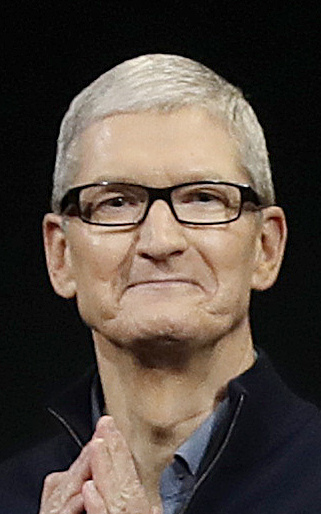Apple says that it intends to bolster the U.S. manufacturing sector by creating a $1 billion “advanced manufacturing fund” – with some of that initial money going toward a company the tech giant is prepared to partner with, chief executive Tim Cook said.
The announcement, which Cook made Wednesday on CNBC, comes after months of focus by President Trump on jobs, manufacturing and the global economy. Cook did not appear to suggest that his company’s decision was influenced by Trump. But the president has showered praise on companies such as Carrier, Softbank and Charter Communications for promising to hire more American workers – even if some of those pledges predated Trump’s tenure.
Unlike those firms, Apple’s announcement was not a hiring promise; the company simply said that it was hoping to promote U.S. manufacturing with its new fund.
“We’ve talked to a company we’re going to invest in already,” Cook said.
Apple intends to invest in programs that can train workers how to code, Cook said. But that much of the money for this effort will be borrowed rather than drawn from its substantial cash reserves.
Cook has spoken previously about the shortage of U.S. workers who can perform advanced manufacturing. Advanced manufacturing differs from typical manufacturing in that it often requires specialized skills to produce highly engineered components that go into Apple’s products.
“The U.S., over time, began to stop having as many vocational kind of skills,” Cook told “60 Minutes” in 2015. “I mean, you can take every tool and die maker in the United States and probably put them in a room that we’re currently sitting in. In China, you would have to have multiple football fields.”
Apple has taken some steps to highlight a commitment to U.S. jobs. In 2013, the company announced that it would begin manufacturing its high-end Mac Pro computer in Texas.
But in recent years, the Mac Pro’s reputation has faltered amid complaints that the device is difficult to upgrade and poorly suited for next-generation computing. The share of Apple customers who use the Mac Pro are in the single digits, according to company execs in a recent interview with a number of Silicon Valley journalists – raising questions about the state of Apple’s U.S. manufacturing presence.
An Apple spokesperson declined to comment for this story. Cook said Apple would release more details about its plans for the manufacturing fund later this month.
Even as it pledges to spend big on what Trump views as a major priority, Apple and other tech companies still have billions of dollars in revenues stashed overseas. Bringing that money home would likely incur a hefty tax bill – which is why Trump has proposed slashing corporate tax rates in a way that encourages businesses to repatriate those funds.
Cook said that he’s hopeful the Trump administration can succeed with that push.
Labor economists say that restoring U.S. manufacturing jobs will be difficult at a time when automation is increasingly threatening to replace many workers. Businesses may move their factories back to the United States, but because American workers are still more expensive to employ than robots, those corporate decisions may not lead to an uptick in hiring.
“The mentality is, ‘Can we increase our output first by becoming more efficient by using better technology as the first resort?’ ” Augustine Tantillo, president of the National Council of Textile Organizations, told the Los Angeles Times.
Analysts predict that even highly specialized industries such as law or radiology may be shaken up by artificial intelligence. And the trend isn’t just problematic for older workers; by 2030, more than a third of all U.S. jobs may be done by robots, according to a recent study by the consulting firmPricewaterhouseCoopers.
Send questions/comments to the editors.



Success. Please wait for the page to reload. If the page does not reload within 5 seconds, please refresh the page.
Enter your email and password to access comments.
Hi, to comment on stories you must . This profile is in addition to your subscription and website login.
Already have a commenting profile? .
Invalid username/password.
Please check your email to confirm and complete your registration.
Only subscribers are eligible to post comments. Please subscribe or login first for digital access. Here’s why.
Use the form below to reset your password. When you've submitted your account email, we will send an email with a reset code.